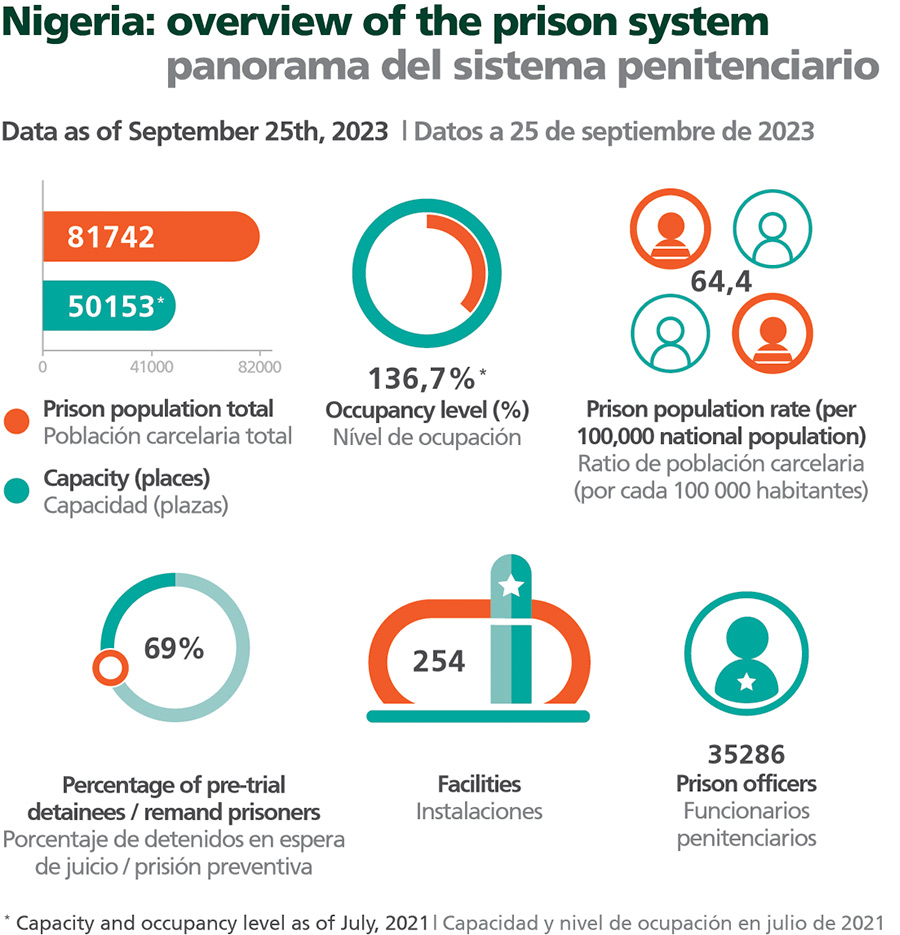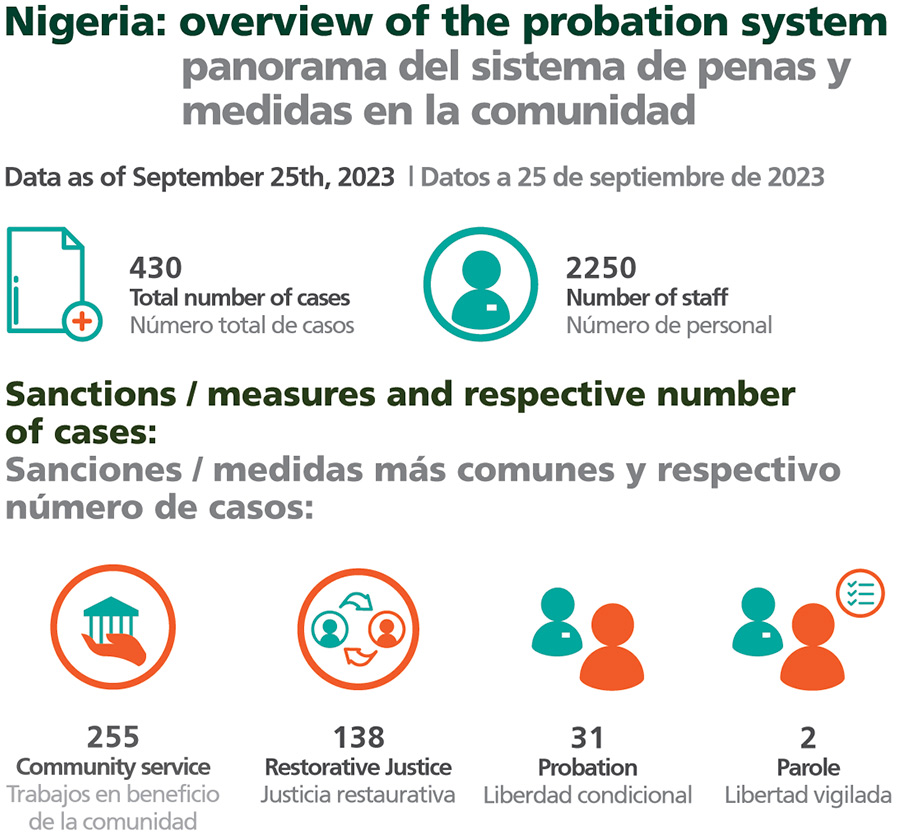Interview
Haliru Nababa
Controller General of Corrections, Nigerian Correctional Service
In 2019, the Nigerian Correctional Service Act was signed into law, bringing about significant changes to the country’s penal system. This new law transformed the Nigerian Prisons Service (NPS) into the Nigerian Correctional Service (NCoS) and introduced a transformational shift in its policy framework, including the introduction of non-custodial services.
In this interview Controller General Haliru Nababa explores the changes brought by this change and the challenges and achievements of the Nigerian Correctional Service.
What were the main changes introduced by the Nigerian Correctional Service Act, 2019, and what progress towards the vision behind the law has been achieved under your leadership so far?
HN: Since the enactment of the 2019 Nigerian Correctional Service Act, we have witnessed substantial advancements in the Service. This pivotal legislation ushered in a host of transformative changes.
The Act institutionalised the functions of the Nigerian Correctional Service (NCoS), delineating its responsibilities and embracing a paradigm shift from a punitive perspective to a more correctional approach. This aligns with best practices, recognising that imprisonment itself is the punishment.
The inclusion of the non-custodial measures is another remarkable milestone for the Service. Petty or first-time offenders previously remanded in custody, are now being sentenced to community service.
This shift has yielded multiple benefits, such as alleviating overcrowding in our Custodial Centres, reducing operational costs, providing a healthier living environment for inmates, and easing tensions arising from overcrowding.
Furthermore, the Act allows for the granting of parole and probation to certain inmates, enabling them to serve part of their sentences outside Custodial Centres. This has significantly contributed to decongesting our facilities.
Another proactive capacity management measure helping to address the persistent challenge of overcrowding is enshrined in section 12(8), empowering Custodial Centre Superintendents to cease new inmate admissions when our Custodial Centres are filled to capacity.
Moreover, the NCoS Act of 2019, in section 14(5), grants us the authority to issue certificates of good behaviour to discharged inmates who have demonstrated positive conduct, including those who have acquired skills through formal and informal education programmes aimed at facilitating their reintegration and minimising stigmatisation.
What are the main challenges currently faced by the Nigerian Correctional Service and how are you addressing them?
HN: The Service is faced with a plethora of challenges that demand our attention, namely manpower shortage, inadequate funding, a lack of working equipment, dilapidated infrastructure, stigmatisation against ex-offenders, and inadequate aftercare services for them.
We are taking several steps to address these challenges. First, we have requested the Federal Government for job postings to fill vacant positions and are awaiting approval to conduct a recruitment exercise.
Second, despite the enactment of the Act in 2019, the non-custodial Directorate of the Service still faces funding challenges. The Service is making frantic efforts to secure approval and release of funds for the full implementation of the non-custodial service. In the meantime, we have initiated a partial implementation of these measures by activating the Parole Board and Community Service provisions. Third, effective implementation of parole and probation requires monitoring devices, which are currently lacking. We are collaborating with various stakeholders in the penal sector to acquire the tools to achieve positive results on this front. Fourth, most of our buildings are nearly a century old.
To address this, we are renovating existing structures and constructing new ones where space permits. Additionally, the rejection of ex-offenders by the public upon their release places a significant burden on the Service. Therefore, we are advocating for the need to expunge the clause that prohibits government agencies from employing ex-offenders. An extensive campaign is also necessary to encourage society to accept returning individuals as reformed persons who have much to contribute to the socio-economic development of the community.

JT: Nigeria is faced with the presence and activities of terrorist organisations, such as Boko Haram and Islamic State of West Africa (ISWA). In 2022, Islamist militants attacked the Kuje prison, near Abuja, freeing hundreds of prisoners, including 60 Boko Haram members.
Has this event led to special prevention and security procedures across the penitentiary system? What are the particular challenges of managing prisoners associated with extremist groups?
HN: While I can’t disclose specifics of these measures which are classified due to security reasons, this event has prompted significant changes in our approach to security and prevention within the penitentiary system.
The challenges we face when it comes to handling inmates linked to extremist groups are multifaceted. We are actively addressing these challenges to enhance the effectiveness of our de-radicalisation programme and improve the management of this particular population within the penitentiary system.
First, we’ve recognised the need for more comprehensive training for our new programme personnel. This includes specialised capacity-building workshops for various professional groups involved in the rehabilitation process. These workshops are designed to equip our professionals with the skills and knowledge necessary to provide effective support for the reformation of individuals returning to society.
Another aspect we’re addressing is the setup of programme locations. Some areas lack dedicated programme offices, hindering our efforts. Having suitable counselling rooms and environments for rehabilitation is pivotal. Some of our programme locations face challenges in this regard, and we’re actively working on improving them. We have also identified a lack of crucial resources for effective rehabilitation, including educational materials, religious resources, sports equipment, medical supplies, and vocational tools at certain locations.
Reintegration and aftercare are incredibly complex challenges, we are continuously striving to enhance our ability to successfully reintegrate violent extremist offenders into society and provide them with optimal aftercare services.
We are also focusing on capacity building related to gender-specific issues and establishing a juvenile component within the programme to address the distinct challenges associated with young offenders.
We are expanding capacity building in a wide range of other issues, namely: data management, monitoring and evaluation processes, effective intake procedures, initial assessment and other assessment tools, theological counter-narratives, sports therapy techniques to improve life coping skills, and understanding in Shia doctrine and practises.
We also need robust ICT solutions to improve communication and collaboration through video conferences and review meetings with teams in the field.

JT: We have learned that NCoS has been working with the United Nations Office on Drugs and Crime (UNODC) and the German Government to strengthen its capacity to effectively rehabilitate prisoners associated Boko Haram.
What progress have these collaborative efforts achieved? What is your perspective on the importance of international cooperation and support?
HN: We have a robust synergy with a plethora of local, national and international organisations, both private and governmental, incluing the UNODC, the International Committee of the Red Cross (ICRC), Prisoners’ Rehabilitation And Welfare Action (PRAWA) and many others.
The importance of international cooperation and support to the Nigerian Correctional Service cannot be overstated. It has significantly assisted the Service in broadening its horizons and exposing it to international standard procedures in offender management.
For instance, this year, in collaboration with the UNODC, we conducted a programme aimed at fostering the effective reintegration of ex-offenders into society in the North East region of Nigeria. This involved meetings with community and religious leaders to raise awareness about the need to embrace and support ex-offenders in their reintegration process into normal community life.
One notable achievement of cooperation initiatives is the positive impact on our efforts to manage individuals with identified risks of re-offending. Thanks to the interventions provided by international donors, we have witnessed a significant downward trend in the risks associated with some of those clients over the years. Moreover, the Nigerian Correctional Service has taken a leading role in the de-radicalisation and rehabilitation aspects of Operation Safe Corridor (OPSC) activities in Gombe State, which aims to rehabilitate repented Boko Haram elements who have submitted themselves to the authority of the state through the Nigerian Military.
Notably, many individuals participating in the program have embraced Western Education, and many of them have not only sat for important examinations like the West African Examination Council (WAEC) and the National Educational Council (NECO), but some have also enrolled in the National Open University of Nigeria (NOUN). This educational focus earned us the prestigious 2018 Confucius Award for Literacy by UNESCO.
Religious re-education and reorientation have also been integral components of the programme’s success. By addressing the ideological aspects of extremism, we’ve made significant strides in rehabilitating individuals with radical beliefs. We have also established partnerships with key stakeholders and organisations in areas such as staff training and development, ensuring health and sanitation in Custodial Centres, capacity building, and advocacy for solutions to the challenges we are presently encountering, such as overcrowding.
This approach of opening our doors to fruitful and meaningful collaborations and partnerships has yielded numerous benefits for both our organisation and the nation as a whole. Through these partnerships, we have improved the well-being of the inmates, providing them with a cleaner and more conducive environment in our Custodial Centres. Our personnel were also able to undergo significant capacity-building, and are now better prepared to perform their duties. Additionally, this initiative has contributed to a better understanding of our organisation’s operations among the public.
Going forward, I expect that these synergies and partnerships will be strengthened and developed to include other areas that have not yet been addressed, especially in the realm of community guidance, research, and the emerging field of non-custodial services. I also expect that this cooperation focus will bring about improved respect for the human rights of inmates in custodial centres, and the overall enhancement of the Service’s management to meet international standards and global best practices.
Haliru Nababa
Controller General of Corrections, Nigerian Correctional Service
Haliru Nababa has been the Controller General of the Nigerian Correctional Service since 2021. He joined the Service in 1990 (then Nigerian Prison Service) as Assistant Superintendent of Prisons. Before his current appointment, he held several leadership roles in the organisation including Head of the Directorate of Finance and Accounts, and Assistant Controller General of Corrections. He holds a Bachelors Degree in History and a Diploma in Criminology from the Usman Danfodiyo University of Sokoto.


